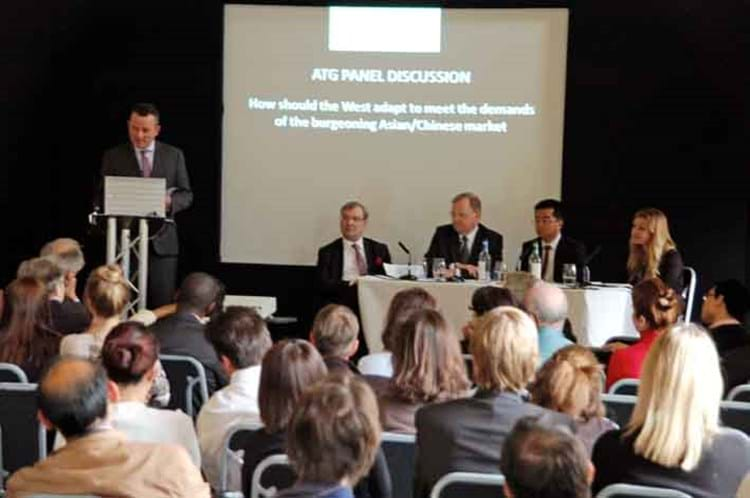
On the rostrum with him were Bonhams' deputy chairman and Global Head of Asian Art, Colin Sheaf, IP specialist lawyer Ben Goodger, of Edwards Wildman, Director of Hong Kong Fair Fine Art Asia, Andy Hei and Kate Bryan, Head of Contemporary Art at The Fine Art Society.
All have extensive experience working in Hong Kong and China and gave some valuable insights into how to go about business there, as well as what to expect in future. Fuller biographical details for each appear at the bottom of this article.
The audience at the event on June 12 heard how China should not be considered as a single nation with a single people, but as a civilisation comprised of a large number of different groups. Mainlanders, Hong Kong Chinese, Western-based Chinese and Taiwanese all have different views and attitudes, advised the panel.
Key considerations also included 'Guanxi', the system of building business relationships, what motivates buyers, how they see the market and cultural differences evident in attitudes to what the West may see as fakes, but the Chinese as tribute pieces.
Colin Sheaf noted that Guanxi can be a mixed blessing. "It's an extremely tight relationship and if you're not within that circle, it will give somebody else an advantage that you don't enjoy. It's not a way of doing business that we understand in quite the same way in the West."
Kate Bryan emphasised that the West often suffered under the misconception that there was a lack of knowledge about Western art and culture in China. "There is a great risk in not understanding that there are quite a few collectors who are highly knowledgeable," she told the audience. This can be especially important when it comes to the vital question of face. "You can unwittingly insult someone's intelligence, which can then become a matter of saving face," she said.
Clarity of Contracts
On the sensitive matter of contracts and business deals, Ben Goodger thought that simple buying and selling contracts were generally fairly straightforward, but what is particularly important is clarity of terms. "Keep it very, very clear," he advised, and "discuss some 'what if' scenarios."
Contracts should always be written down rather than verbal, he also said. It doesn't have to be a long contract, just clear with, importantly, an accurate translation into Chinese.
As for enforcement of contracts, he confirmed it is a real problem. The Chinese tend to avoid litigation because it risks confrontation and loss of face. Mediation is key to resolving disputes, he concluded.
Colin Sheaf, meanwhile, looked at jurisdiction. Enforcing English law in China is difficult but can be done, he said, although it can be very expensive to do so. In reality, Western businesses need to be realistic, he advised. The best thing to do is ensure a sound business relationship to start with rather than trying to solve problems after a deal has gone wrong. "There have to be fairly robust safeguards in place right from the beginning," he told the audience.
Andy Hei focused on trades between dealers and clients and advised against taking deposits on deals "because Chinese customers will then think they own the object and it can take months to conclude the deal".
Chinese Tastes
There were different shades of opinion in how Chinese tastes may develop and whether or not the future would see a demand for mainstream Western fine and decorative arts.
Chinese Contemporary art is greatly sought after, and there is some evidence of demand for other Contemporary art, but it is not clear whether this is for collecting or investment purposes.
As Colin Sheaf noted, however, there was still little demand in the East for Chinese Export wares. With this in mind, it was difficult to see how taste would spread to European furniture and ceramics, for instance, in the short term.
Andy Hei, while agreeing with this, thought that as new generations of collectors emerged, they might be more open to acquiring a wider range of art and antiques.
The panellists also gave some insight into what the key considerations are in developing business contacts in Hong Kong or mainland China, or even setting up a business there.
Business in Hong Kong
What became clear is that all speakers considered doing business in and from Hong Kong was the way ahead. Tax, bureaucracy, culture and market sophistication make it a far more attractive option than setting up in mainland China, it seems.
Ben Goodger gave some detail on the options for setting up a business in mainland China and talked about the 'WOFE' or wholly owned foreign enterprise. These limited liability vehicles allow businesses to operate subsidiaries in China while protecting IP and technology, and they can enjoy less stringent currency controls than domestic firms.
Colin Sheaf explained that setting up mainland China operations for auction houses such as Bonhams, Sotheby's and Christie's, was 'intimidating' because, apart from other considerations, any joint venture could compromise an auction house's ability to guarantee the lots that they offered.
Kate Bryan added that developing institutional links should be at the centre of any business plan for galleries setting up in the Far East. "In 2012 there will be more than 200 new museums opening in mainland China," she revealed. "Developing relationships with curators and those institutions will be essential if you intend to be there for the long term."
In summary, building close relationships with clients, developing knowledge of the culture and language, understanding the issue of 'face' and being clear and respectful in all dealings are the vital components of succeeding in business in Hong Kong and China.
Speakers' Details
Colin Sheaf, an authority on Asian ceramics and Asian art and head of Asian art at Bonhams and chairman of Bonhams Asia, directs teams in London, Hong Kong, New York, Los Angeles and San Francisco. Having developed Christie's business in Hong Kong during the 1980s, he played a leading role in the great shipwreck sales of the 1980s and '90s. In November 2011, he achieved the highest price during the London Asian art auction series when he sold a Qianlong vase for £8m hammer, as well as seeing Bonhams pass both Christie's and Sotheby's for the total amount taken in the series for the first time.
Outside Bonhams, Colin has been most excited by his involvement as one of the two trustees of the Percival David Foundation, the greatest collection in private hands in the western world of Imperial Chinese ceramics. (www.bonhams.com)
Andy Hei is the second generation of the Hong Kong Chinese H.L. Hei family, dealers in huanghuali and zitan furniture from the Ming and Qing dynasties for over 50 years. He established his own classical Chinese furniture gallery, Andy Hei Ltd, in Hollywood Road, Hong Kong, in 1999.
Andy's years of experience of participating in several art fairs in London and New York led him to launch the first annual Hong Kong International Asian Antiques and Arts Fair in 2006. He has developed an active fairs programme since then, culminating in Fine Art Asia, which runs each October.
A collector of Chinese paintings and works of art, as well as Asian contemporary art, he writes a special column for ATG, sharing his view on the Asian and Hong Kong art market. (www.fineartasia.com)
Kate Bryan joined the Fine Art Society in London's Bond Street as head of contemporary in 2011, having previously been gallery director of The Cat Street Gallery in Hong Kong.
During her four years in Hong Kong, Kate was responsible for bringing important international names to the HK art world, including solo shows for Sir Peter Blake, Gavin Turk, David Mach, Debbie Han and a collaboration between David Lynch and the shoe designer Christian Louboutin. She was the Hong Kong Contributing Editor for Asian Art News and World Sculpture News, as well as a regular contributor of arts and travel features for Kee Magazine, Sentinel Magazine and The South China Morning Post.
Prior to moving to Asia, Kate worked at the British Museum for five years. (www.faslondon.com)
Ben Goodger is a partner with international law firm Edwards Wildman, which has 14 offices including London, Boston, New York and Hong Kong. An intellectual property (IP) practitioner, he has over 20 years experience in advising companies on the strategic management, commercialisation and protection of their valuable IP. Ben's clients include multinational corporations, SMEs, lenders, and academic institutions. He spent two years in Shanghai, where he managed his previous firm's China business and Asia commercial IP groups, and has internationally-recognised expertise in advising on strategies for the protection, commercialisation and management of IP assets in China and Asia. Intellectual Asset Management magazine listed him in its IAM Strategy 250 - The World's Leading IP Strategists in 2009, 2010 and 2011. (www.edwardswildman.com)




